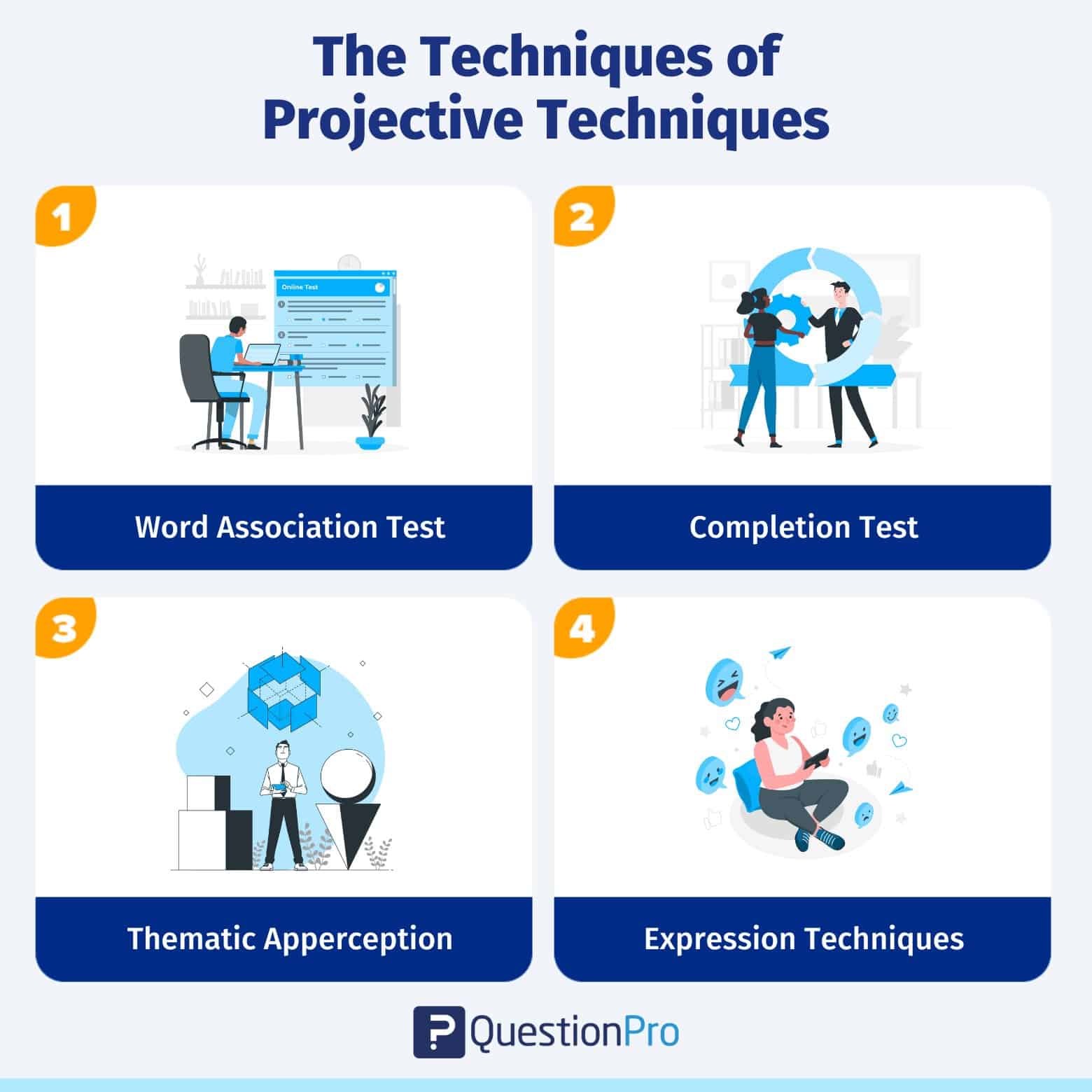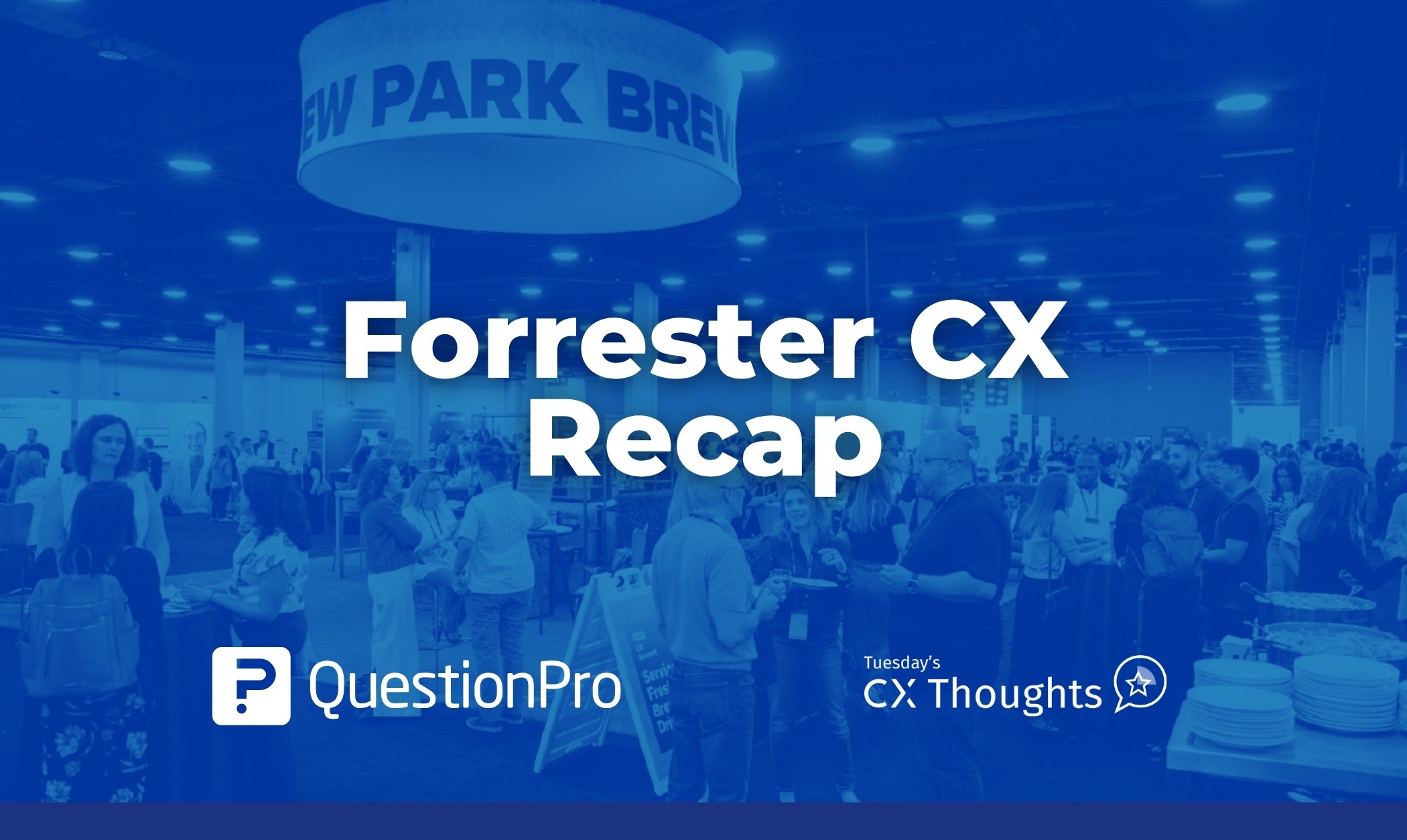
Respondents do not frequently express deeply intrinsic motivations and attitudes when asked explicitly. Respondents might need to be aware of these specific attitudes or think their intentions are unflattering. Respondents can use projective techniques to project their objective or subjective ideas and beliefs onto other persons or even inanimate things. From what the respondent says about other people, one might therefore infer the respondent’s true feelings.
Most of the time, projective techniques are used in interviews with one person or a small group. Please find out about projective techniques, its definition, and examples in this blog.
Definition of projective techniques
Projective techniques are many ways to assess a person’s personality that rely on a predetermined sequence of random inputs to elicit the subject’s frequently peculiar answers.
Psychologists have developed projective tests technique, which are indirect and unstructured ways to find out about people. They use respondents’ projections to discover hidden motives, urges, or intentions that can’t be found through direct questioning because the respondent either doesn’t want to tell or can’t figure out himself.
Despite appearing straightforward, projective techniques frequently require the assistance of a licensed psychologist to help design the tests and appropriately evaluate them.
Importance of projective techniques
Projective techniques play important roles in a number of different fields and types of research. Here are some of the most important reasons why people think projective techniques are important:
Exploring the unconscious
Researchers can access people’s unconscious ideas, emotions, and motivations using projective techniques. These methods give us a look into parts of the mind that may be hard to learn about through direct questions or self-reporting. The projective test technique can find hidden factors that affect behavior and decision-making by revealing unconscious processes.
Understanding emotions and attitudes
Emotions and views greatly impact how people act and make decisions. Projective techniques allow people to study and understand their feelings and attitudes, even if they are unaware of them. This deeper understanding of emotional and attitude factors can be especially useful in areas like psychology, marketing, and advertising.
Social desirability bias is a common problem in research, where people tend to give answers that they think are socially acceptable or desirable instead of what they really think or feel. The effect of social desirability bias is lessened by using projective techniques, which are less direct and more flexible. This lets us get more honest and fair information about people’s thoughts and feelings.
Stimulating creativity and imagination
Projective techniques often involve creative and imaginative jobs, like telling stories, drawing, or finishing sentences. These tasks make people more creative and urge them to think outside of the box. By getting people to use their imaginations, projective techniques can bring out new ideas, views, and connections that might not come up with more structured methods.
Enhancing qualitative research
Projective techniques are frequently utilized in qualitative research to collect comprehensive and rich data. By introducing new levels of comprehension and depth, they support other qualitative techniques like focus groups and interviews. Projective approaches are open-ended, allowing participants to express themselves in their own special ways. This gives market researchers a deeper understanding of the participants’ experiences, beliefs, and values.
Facilitating therapeutic processes
Projective techniques can be used in therapy to help people figure out and talk about their ideas, feelings, and experiences. These methods give people a creative, non-threatening way to connect with their inner world and learn more about their mental health. Self-reflection, personal growth, and healing can all be aided by projective techniques like art therapy, sand play, or guided imagery.
While projective techniques have limitations and should be used judiciously, they play a valuable role in research, therapy, and understanding human behavior, emotions, and motivations.
The techniques of projective techniques
Projective techniques are so crucial in attitude surveys or motivational research. Projective testing techniques are beneficial in allowing respondents to voice their opinions without feeling self-conscious. These techniques assist the respondents in unwittingly projecting their attitudes and sentiments into the research topic.
Some of the essential projective techniques are:

1. Word Association Test
Word association tests can be applied in a variety of contexts:
- Respondents can be given a set of words or phrases in a random order, then asked to state or write the first word or phrase that comes to mind.
- Respondents are asked what word or phrase instantly comes to mind when hearing specific brand names.
- Respondents can also be questioned regarding slogans and what they imply;
- Respondents are asked to provide a “human attribute” or pair a descriptive term with an inanimate object or product to characterize it.
For example, a team of tourism experts was requested to identify personality qualities or “human characteristics” for both the villages and the towns in their region as part of developing a strategic marketing plan for their community.
LEARN MORE ABOUT: Personality Survey
The majority of the tourism sector representatives were from urban areas, and they vehemently asserted that metropolitan areas had historically been ignored in marketing initiatives.
Through these and other experiments, they realized that the rural areas were a significant aspect of the destination’s overall attractiveness and that they needed to be highlighted as essential components in any marketing strategy.
2. Completion Test
The sentence completion method asks responders to finish sentences that have been left unfinished. These statements are typically written in the third person and have a propensity for ambiguity.
Depending on the respondent’s personality, the following sentences, for example, would be completed in a variety of striking ways:
- “A beach getaway is…”
- “Visiting the mountains for vacation is…”
- “The purpose of golf is…”
- “The typical individual thinks of skiing…”
- “Museum visitors tend to be…”
In general, sentence completion tests are simpler to comprehend than word association tests since the offered answers are more thorough. However, the respondent can more easily tell what they’re trying to do, which can lead to less sincere answers.
The tale completion test is a variation of this technique. The respondent is given a story in words or visuals and is then asked to finish it in his or her own words.
3. Thematic Apperception
The Thematic Apperception Test (TAT) asks participants to describe a scene, potential character dialogue, and/or how the “narrative” might develop after viewing one or more photos. The photo interpretation technique is another name for TAT because of this.
TAT can be utilized in many different contexts, from eliciting characteristics of various products to forming opinions about the types of people who could use particular goods or services.
For example, after viewing a sample logo, respondents were questioned about the nature of the destination that would use it and what a tourist might find there. Among the remarks were:
- That reminds me of the garden.
- It is undeniably the largest city in the nation.
- The Empire State Building right there gives it a New York vibe.
- Soothing, unwinding. It has a regional focus because a tree blocks your view of the countryside, and you can see the city and buildings in the backdrop.
4. Expression Techniques
The expression technique is more frequently employed than any other projective technique to obtain respondents’ deeply held beliefs and attitudes that can be interpreted as reflecting poorly on the person. People often identify themselves as “virtues” that they perceive in others as “vices.”
For example, when asked why someone would decide to take an Alaskan cruise, the answer may be due to the high quality of the scenery, the chance to connect with intriguing people, or the chance to experience a new culture.
But when the same question about why a neighbor may take such a cruise is posed, the answer may very well be because of “brag appeal” or to brag.
Respondents can discuss opinions they might not necessarily admit to holding for themselves when given a chance to talk about someone else, such as a neighbor, a relative, or a friend.
The third-person approach can be more dynamic by including role-playing or practice. In this scenario, the respondent is instructed to mimic the actions or voice the feelings of a third party. This strategy can be quite beneficial, especially when working with kids who “know” how others would behave but may not always be able to articulate it verbally.
Pros and cons of projective techniques
Here are the pros and cons of projective techniques summarized in bullet points:
Pros of projective techniques:
- Access to unconscious thoughts and emotions.
- Enhanced self-expression.
- Qualitative insights.
- Stimulates creativity and imagination.
Cons of projective techniques:
- Subjectivity and interpretation.
- Limited standardization and norms.
- Time-consuming and resource-intensive.
- Limited empirical support.
- Limited diagnostic utility.
It’s important to consider these factors when deciding to use projective techniques and supplement them with other assessment methods to understand an individual’s psychological profile comprehensively.
Conclusion
Several factors make projective techniques beneficial. They can be crucial for gaining more insight into the subconscious and helpful for giving moderated discussion something “different.”
Projective techniques are helpful when researching topics that customers may only find simple to explain an opinion. You must remember the purpose of the projective technique if you want to be a successful moderator.
You may shorten the time it takes to create a new product by integrating your experience data into QuestionPro research. You may quickly launch new items by identifying market gaps.
Frequently Asked Questions(FAQ’s)
Projections. Word association test. Tests of the written word. Thematic Appearance Tests (TATs) Three-person techniques.
It’s a technique where people give their answers in one word or phrase and then ask the other person what comes to mind first. In this case, researchers can show brands with the answers from respondents, and each respondent can share their best word in the answer.







